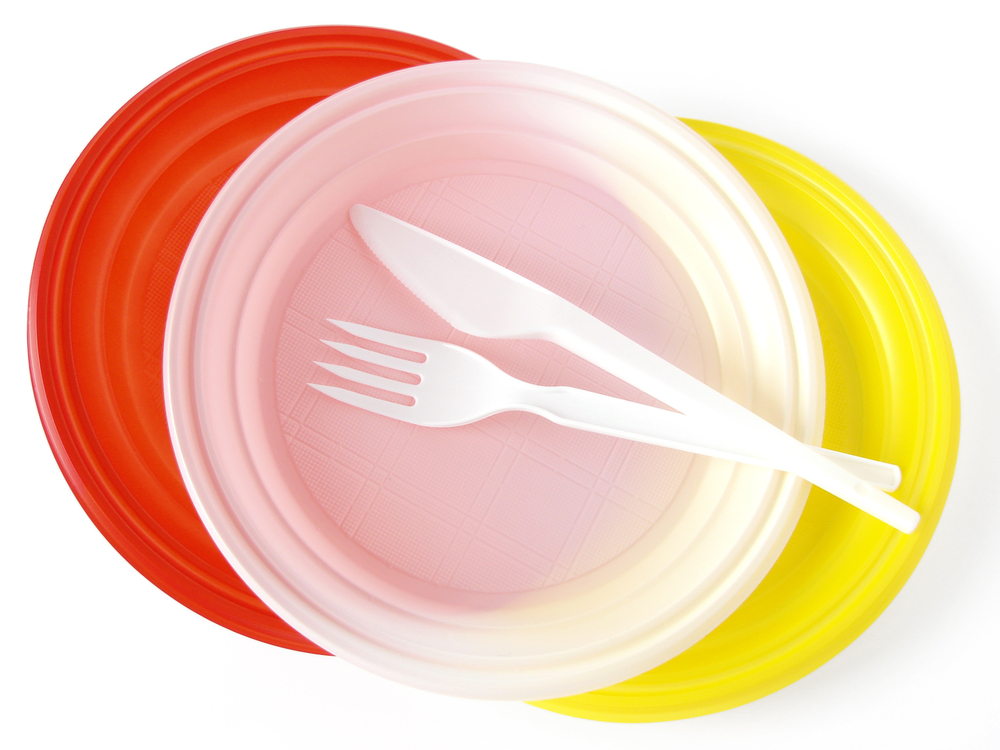Part of the Food Policy Snapshot Series
Policy name: Single-use plastics ban in England
Overview: UK Environment Secretary Thérèse Coffey has announced plans to ban various single-use plastics in England starting in October 2023.
Location: England
Population: 56 million
Food policy category: Environmental health, climate change
Program goals: To reduce pollution from plastics and greenhouse gas emissions that harm marine life and the environment.
How it works: Starting in October, the following single-use plastic items will not be provided or sold, to consumers, retailers, food vendors, and the hospitality industry:
- Plates
- Trays
- Bowls
- Cutlery
- Balloon sticks
- Certain polystyrene cups and food containers
Plastic plates, trays, and bowls that are used for shelf-ready, pre-packaged food items will be exempt from the ban, but will be the target of a future campaign incentivizing producers to use more recyclable materials.
A ban on single-use plastic straws, stirrers, and cotton swabs has been in effect since October 2020. A five pence charge for single-use plastic shopping bags went into effect in major supermarkets in 2015. The charge increased to 10 pence per bag and was extended to all retailers in May 2021.
Progress to date: In November 2021, the then-Environment Secretary, George Eustice, announced plans for banning single-use plastic cutlery and plates. A public consultation was open from November 2021 through February 2022, and the current Environment Secretary, Thérèse Coffey, officially announced the ban on January 14, 2023.
Why it is important: The United Kingdom’s Department of Environment, Food and Rural Affairs has reported that England uses 2.7 billion pieces of single-use cutlery and 721 million single-use plates every year, but only 10 percent of these items are recycled. When not recycled, plastics can take up to 500 years to break down naturally.
Because they are light, plastics are often carried by the wind to litter the environment and enter rivers and oceans, and there are close to 700 species of wildlife known to be affected by plastic pollution. When plastics break down into microplastics, it is nearly impossible to remove them from the environment. Plastics and microplastics not only harm marine life and land-based animals, but they have also been found in much of the seafood – including fish, shrimp, and mussels – that humans consume.
Furthermore, the production and incineration of plastics globally produced 850 million tons of greenhouse gas emissions in 2021 and could rise to 2.8 billion tons by 2050. Greenhouse gas emissions contribute to climate change and its consequences, including negative effects on global food security and food safety.
Program/Policy initiated: The policy will go into effect in October 2023.
Point of contact:
Department for Environment, Food & Rural Affairs
Email: enquiries@environment-agency.gov.uk
Phone: +44 3708 506506
Similar practices: Scotland banned most single-use plastics except for single-use straws and balloon sticks as of August 12, 2022. In December 2022, Wales passed a similar ban on single-use plastics that will go into effect in 2024. In June 2022, California passed the strictest plastic legislation in the United States, calling for all plastic in the state to be recyclable or compostable by 2032.
Evaluation: Evaluation has not yet been conducted.
Learn more:
- The Climate Impact of Single Use Plastics (The University of Colorado Boulder)
- England Set to Ban Plastic Cutlery to Cut Back on Waste and Marine Environment Pollution (USA Today)
- England Set to Ban Some Single-Use Plastics (CBS News)
- October Start Set for Ban in England of Single-Use Plastic Tableware (The Guardian)
- Plastic Cutlery Becomes Rarer as England Joins Global Effort to Ban Them (Washington Post)
- Single-Use Plastic Cutlery and Plates to be Banned in England (The Guardian)
- Single-Use Plastic is Wreaking Havoc on the Planet. Here’s What You Can Do to Minimize Your Impact (CNN)
- Single-Use Plastics 101 (Natural Resources Defense Council)
- UK Government Eyes Ban on Single-Use Plastic Plates and Cutlery (CNN)
References:
- 10p Plastic Bag Charge to Come Into Force on 21 May (GOV.UK)
- Climate Change, Global Food Security, and the U.S. Food System (United States Department of Agriculture)
- Consultation on Proposals to Ban Commonly Littered Single-Use Plastic Items in England (Department for Environment Food & Rural Affairs)
- England Will Ban Single-Use Plastic Plates and Cutlery for Environmental Reasons (NPR)
- The Environmental Protection (Single-use Plastic Products) (Wales) Bill (Welsh Parliament)
- Far-Reaching Ban on Single-Use Plastics in England (GOV.UK)
- Governor Newsom Signs Legislation Cutting Harmful Plastic Pollution to Protect Communities, Oceans and Animals (Office of Governor Gavin Newsom)
- How Does Plastic End Up in the Ocean? (World Wildlife Fund)
- The Lifecycle of Plastics (World Wildlife Fund Australia)
- Microplastics (National Geographic)
- Plans Unveiled to Ban Single-Use Plastics (GOV.UK)
- Plastic Straw Ban in England Comes Into Force (BBC)
- Plastic Waste and Climate Change – What’s the Connection? (World Wildlife Fund Australia)
- Scotland’s Single-Use Plastics Ban: Fully Effective From 12 August 2022 (Zero Waste Scotland)
- Single-Use Plastic Cutlery and Plates to be Banned in England (BBC)


